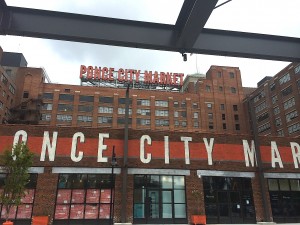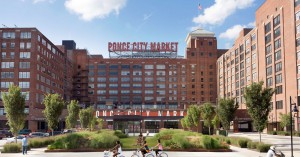Exclusivity and Ponce City Market
By Julia Zimmerman
Ponce City Market’s Implications on Varying Socioeconomic Classes:
With over a million square feet of retail and residential space, Ponce City Market is rapidly becoming Atlanta’s most prominent hub for economic consumption. Fancy boutiques, elegant restaurants, and innovative businesses sound appealing, especially when all establishments are conveniently located within the same entity. But what implications ensue? Do marginalized groups pay the price for the construction of luxury retail? Ponce City Market, a mixed-use development located on 675 Ponce de Leon Avenue, and its surrounding communities have been influenced by political, economic, and social factors. With the association between political leaders, urban planners, and residents, endeavors have been conducted to revitalize the city of Atlanta. This democratic process has its benefits in redeveloping obsolete properties for renewed use, although disadvantages can also occur that perpetuate the isolation of particular groups. Ponce City Market has not allowed equal opportunities for lower-income families to engage in the market’s activity. As a result, exclusivity of particular socioeconomic groups ensue. Perhaps not malicious in intent, but the market has alienated poorer classes from engaging in its economic, social, and communal benefits. The influences of such exclusivity are dense and must be acknowledged when examining the market’s impact on urban landscape.
Factors of Exclusivity:
Ponce City Market’s Exclusivity:
As noted by retail, business, parking, housing, and surrounding neighborhoods, lower-class incomes become excluded by the establishment of Ponce City Market within Atlanta. Though Gravel has expressed interest in providing equal housing opportunities for all incomes within Atlanta, the reality does not mirror such intentions. Unfortunately, the market predominantly targets wealthier individuals, thus alienating poorer families from fully participating within the market’s realm. Lower classes do not have the means and entitlements to engage in the social landscape of Atlanta. However, residents can stop this isolation at the local level. Individuals expressing concerns serve to make strives for equality. Exercising democracy such as communicating to local city planners, developers, and politicians can help bring awareness to the issue that Ponce City Market presents. Modern, fancy, mixed-use developments sound ideal within the constantly-evolving city of Atlanta, though its implications on citizens must be noted. As a community, we cannot allow construction to occur at the expense of marginalized groups; exclusivity will not define Atlanta. Instead, Ponce City should extend to broader demographics – inclusive, accepting, celebrating. Let’s end the disparity between socioeconomic groups within the social landscape of Atlanta.
Sources:
INCLUDE SOURCES HERE

